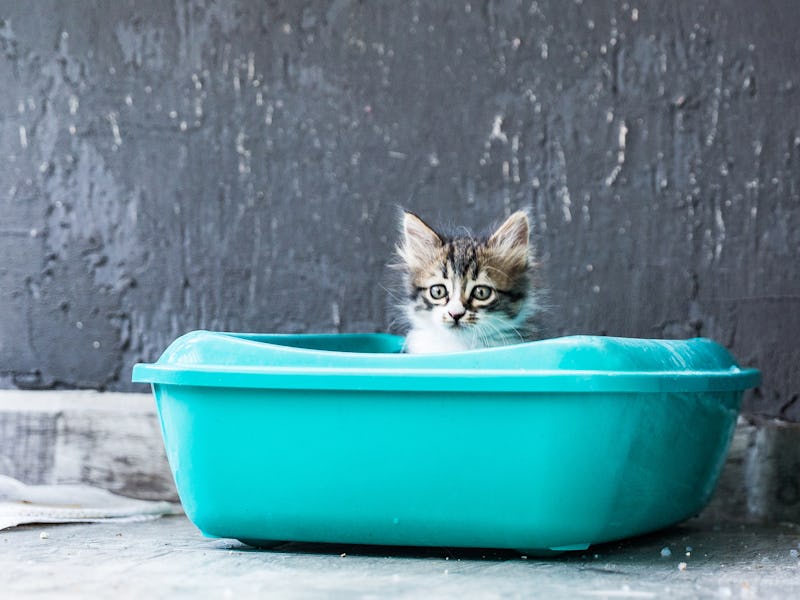Are Stainless Steel Litter Boxes Better? Two Vets Weigh In
The Cybertruck of the litter box world is a tempting purchase — but certainly not for everyone.

If a plastic litter box is a standard car, then a stainless steel one might as well be a Cybertruck: ultramodern, scratch resistant, possibly gratuitous. So how do you know whether you should upgrade — or if a stainless steel litter box is actually superior? The science and pragmatism behind these two options doesn’t offer a clear answer, but confirms that these choices are to be made on a case-by-case basis.
“I try not to take a one size fits all approach to anything,” Mikel Delgado, a cat behavior consultant in Sacramento, tells Inverse. In other words, plastic and stainless steel each have their strengths.
On the one hand, plastic boxes are often cheaper, lighter weight, and come in a variety of sizes. Size is crucial because, Delgado says, litter boxes ought to be one-and-a-half times a cat’s length to provide ample room to dig, eliminate, and bury.
On the other hand, plastic isn’t as durable as stainless steel. According to Autumn Vetter, a veterinarian and clinical professor at the University of Georgia College of Veterinary Medicine, it’s also more porous than stainless steel, offering more microscopic holes for bacteria to make homes in. Deep scratches in plastic can also create more spots for bacteria to hide out, whereas stainless steel is largely impervious to this damage.
While stainless steel appears to have an edge, it’s worth considering the settings that often have stainless steel equipment. “They can be really practical in animal shelters” where there is heavy use Delgado says, “because they are scratch resistant and can be sanitized.”
In an animal shelter, where there is heavy use, stainless steel litter boxes make perfect sense.
Vetter agrees that it makes sense for hospitals and animal shelters to use stainless steel litter boxes for the myriad cats that churn through each day. Their less porous surfaces are easier to sanitize between users. “This makes them less likely to harbor bacteria or other diseases in a shared litter box setting,” Vetter says. The cats coming to shelters and hospitals all host different kinds of communicable bacteria that can stick around on plastic boxes, so stainless steel is a more hygienic option where more cats of all stripes are concerned.
In her work at the University of Georgia, Vetter says her team likes to put everything through a cage wash, which washes and sanitizes things like bowls and litter boxes between patients “to limit any spread of communicable diseases as much as possible.” It’s much more efficient to keep stainless steel around for this ritual, minimizing disease transmission.
But this extreme level of hygiene often isn’t necessary for the average cat household. “Plastic litter boxes, while perhaps not as easy to clean or as ideal to use in a hospital setting, are much cheaper and more practical for a cat parent to have in their home,” Vetter says. If you’ve only got one cat, then you don’t need to worry about disease transmission between cats. And even if you have multiple cats, lingering bacteria becomes a problem for immunocompromised kitties.
“Plastic litter boxes, while perhaps not as easy to clean or as ideal to use in a hospital setting, are much cheaper and more practical for a cat parent to have in their home.”
Delgado herself says light, regular cleanings are all that any box needs. In addition to scooping twice daily, she cleans the box with mild soap and water monthly. She also uses an unscented pet enzyme cleaner weekly.
One last point for stainless steel is its durability. Delgado recommends replacing a plastic litter box every year or two depending on how scratched up it gets. This isn’t necessary for the oh-so-modern stainless steel option.
At the end of the day, while stainless steel seems to have a sanitary edge, Delgado and Vetter don’t seem convinced that it’s an inherently better option. Furthermore, Delgado says that some cats don’t like the feeling of stainless steel on their paws, though that’s a highly individual preference.
So the Cybertruck of litter boxes is truly a matter of preference — both yours and, more importantly, your cat’s.